It’s Any Man’s Race in Detroit’s District 2
The city’s largest group of voters will decide the district’s future on November 8th.
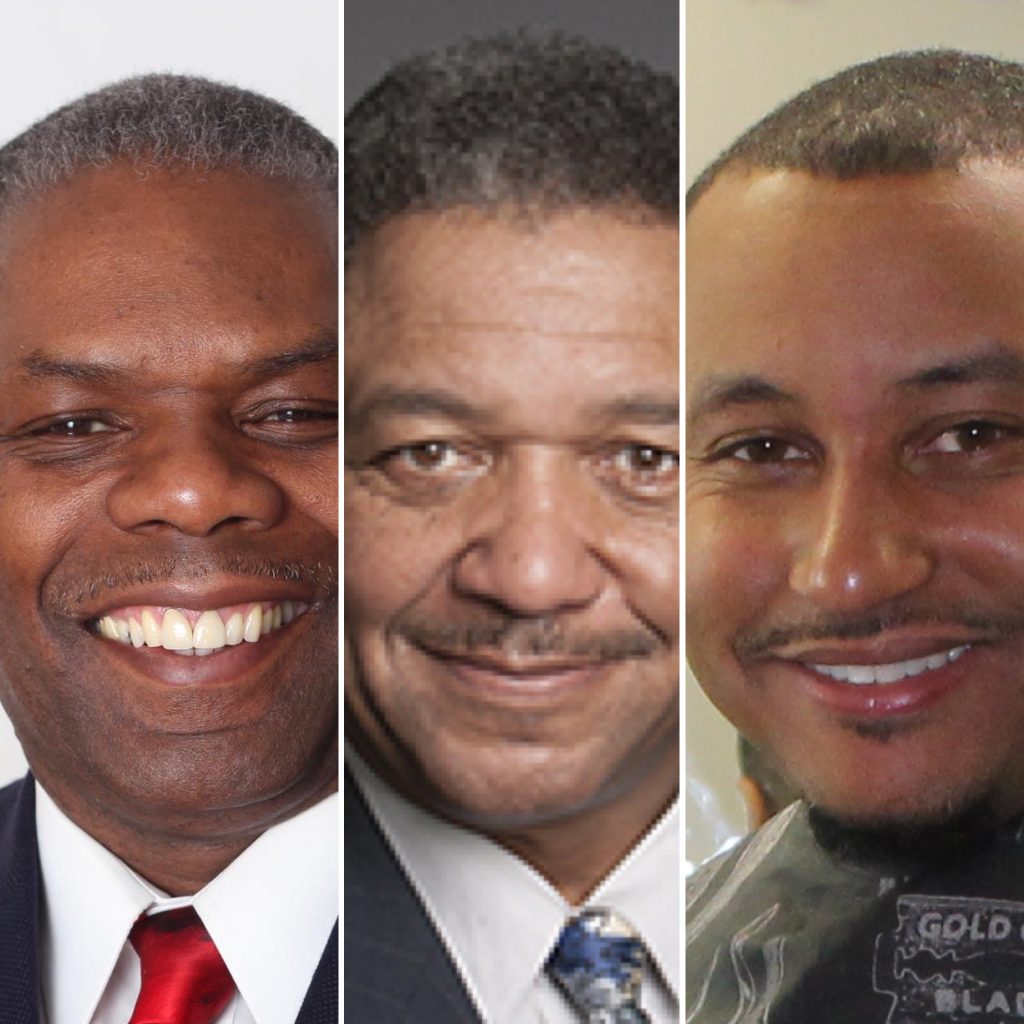

District 2: Detroit’s Biggest Group of Voters
It’s late in the evening at the campaign office to elect Roy McCalister Jr. to Detroit’s City Council. A few volunteers are still trickling into the room when campaign manager Shannon Rochon begins the meeting with a prayer.
“Father, in the name of Jesus, we thank you for this day,” says Rochon. “We thank you for this time. We thank you for our candidate Roy McCalister.”
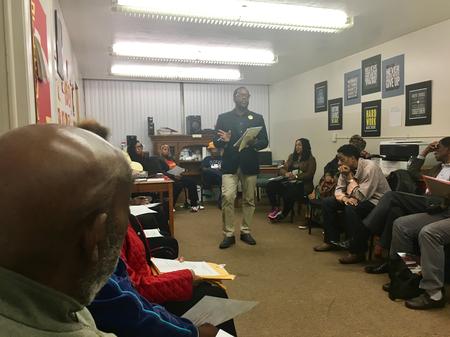
The room is covered wall-to-wall with decorations – inspirational quotes, a poster of President Barack Obama and large, printed maps of District 2.
The district itself makes up a good portion of Detroit’s Northwest side. It’s home to some of the city’s wealthier neighborhoods such as Palmer Woods and the University District, where the median household income is more than $85,000. And there’s a whole section of neighborhoods like Bagley, Winship and College Park that branch off of Outer Drive.
In the August primary, District 2 had the biggest turnout of voters in Detroit with more than 12,000 ballots cast. In that election, McCalister came out on top, earning nearly 25 percent of the vote. It put him ahead of former state representative Virgil Smith, who came in second, and incumbent Council Member George Cushingberry Jr. Still, prior success doesn’t stop McCalister from playing it safe.
“It’s like I tell everybody, I’m running this race just like I’m in third place,” McCalister tells a group of volunteers. “I’m trying to get to everywhere. I don’t have time to get sick. I don’t have time to be flustered. Not until November 8th. November 8th, you might not even see me no more, but until that time I will be out here.”
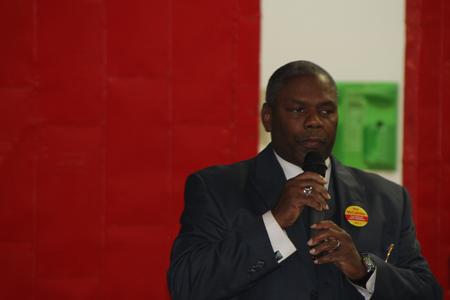
Roy McCalister Jr.: Political Rookie, Veteran Cop
McCalister knows what it’s like to be a runner-up. The former federal investigator ran for Detroit City Council in every election since 2009, and once in the 2014 Democratic primary elections for the Michigan House of Representatives. He has yet to win a seat at the table.
June Mack, an active community member living in Winship, says she’s voted for her neighbor McCalister every time he’s been up for council.
“He’s one of us. He’s here for us,” Mack says. “He’s a retired police officer; we need somebody with structure. He’s a veteran, too. “
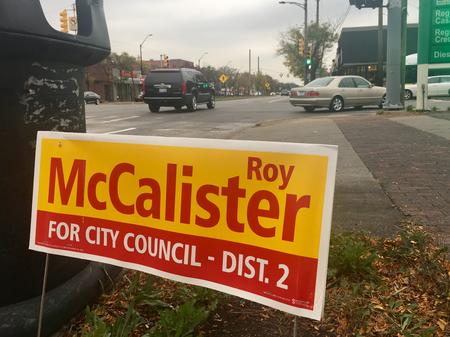
Mack likes McCalister’s core campaign goals – improve the quality of life for District 2, grow development and reduce crime, blight, and foreclosures. Whether it’s protecting the district’s senior citizens or encouraging homeownership, Mack thinks McCalister will emphasize safety in the neighborhoods.
“We really need animal control right now, because there’s a lot of stray dogs running around in these streets,” Mack says. “My mail lady was attacked by a pit-bull two weeks ago and that’s awful. And she’s still working.”
Precinct delegate Michelle Broughton, a schoolteacher and treasurer for the McCalister campaign, feels the same way about her candidate’s values. She says the district needs a change because incumbent Council Member George Cushingberry doesn’t connect with the community.
“He didn’t show up to the block clubs. He didn’t respond to us. When he responded, he said it was more important to work on the budget, to balance the budget,” Broughton says. “It’s also important to find out what’s wrong in your district that you represent, that your constituents are having an issue with.”

Council Member George Cushingberry Jr.: Off the Ballot, On the Trail
Cushingberry says communication is something he’ll work on if elected for another term, by increasing his district’s direct mailing efforts. He says senior citizens are often out of the loop because he prefers the Internet to the post.
“I have been very frugal in the way that I’ve approached delivering my services to the people in terms of having constituent relationships,” says Cushingberry. “I feel that I missed an opportunity to better communicate by using direct mail.”
Cushingberry points to the city’s current successes as proof of his political know-how. As for current issues in this election, Cushingberry maintains a positive stance on the two ballot proposals that would loosen the regulations of Detroit’s medical marijuana industry. It’s an issue that both of his challengers, and many residents, oppose.
“With the crisis that we have on blight, it doesn’t make sense to add to it by picking and choosing how people get their pharmacies,” Cushingberry says. “I’m for both of the proposals.”
As for the write-in campaign, Cushingberry doesn’t seem too worried.
“Don’t forget: we wrote in Mayor Duggan when they did something similar to him four years ago,” says Cushingberry.
The reality is, the amount of money Cushingberry has in this race pales in comparison to Duggan’s mayoral bid. Of the district candidates’ three campaign committees, Cushingberry’s has raised the least amount of money with the fewest number of gifts. Two union donations make up roughly a third of his $21,000 campaign fund. Another two donations of $2,000 from executives affiliated with businessman Dan Gilbert brings that to more than half.
Conversely, Roy McCalister has raised the most towards his campaign with more than $58,000 in his committee. Though the bulk of the McCalister’s funds came from his own contributions, more than 130 different backers gave $100 or less.

Virgil Smith’s Chance at “Redemption”
Smith is getting a line up for an upcoming campaign event. He’s been seeing the same barber since 22-years-old, the age when he started his political career.
“He was one of the people that grilled me the hardest when I ran for state representative in 2002, making sure that I understood that I wasn’t in college anymore,” Smith says. “At that time, it was getting my mind prepared for what I was embarking on.”
Things have changed since then.
While serving as a state senator, Smith was arrested for felonious assault, domestic violence and other crimes when he was accused of shooting at his ex-wife’s car. Smith entered a plea bargain with Wayne County, agreeing to plead guilty to one of the lesser charges, serve 10-months in jail and not hold public office during his five-year probation. Smith voluntarily resigned from office at the state capitol.
But during Smith’s sentencing, the Wayne County Circuit Court stripped parts of the deal that would have barred him from holding public office, claiming it was unconstitutional to do so. Wayne County Prosecutor Kym Worthy has since appealed the decision, moving to re-negotiate the plea deal and stop Smith from running for office.
While the state’s lower courts have ruled that Smith can run for Detroit City Council, the ongoing legal drama has now reached the Michigan Supreme Court, which is delaying a ruling until after the election.
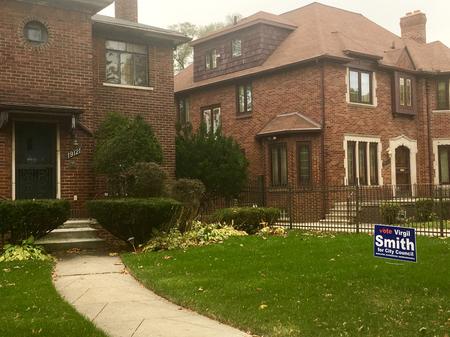
Smith says he tries to be truthful about the situation to his potential voters.
“I think I’ve been able to show them my true personality, and who I really am,” Smith says. “Not this monster that I’ve been made out to be in the media for those that didn’t know me.
Smith says he does that by staying active on the campaign trail; his direct cell phone number is printed on the flyers he hands out. He’s raised almost $30,000 towards his campaign from various businesses and residents. He’s scored large contributions from the Michigan United Auto Workers and from Detroit International Bridge Company President Dan Stamper and his wife.
Smith says he has plans for Detroit’s biggest problems, like introducing group pooling to lower car and home insurances where the municipality acts as the residents’ agent. Smith sponsored many insurance-related bills while in Lansing. And there’s his plan to expand Detroit homeowner tax incentives.
“Whenever somebody speaks on these tax incentives for entities in downtown and midtown, well we have one for homeowners but it needs to be expanded,” Smith says. “It’s only up to 15 percent of the city’s total acreage, and they only use four percent. It would be a 12-year reduction in your property taxes with a three-year phase in.”
Regardless of the reason, Smith is attracting voters. He was just 350 votes shy of beating out Roy McCalister in the August primary. And with fewer names on the ballot and more voters expected to show up to the polls this time around, there will be more variables at play November 8th. In any situation, Smith doesn’t see his political future as another chapter of criminality in Detroit’s upper echelons.
“You know you got to have an uplifting story out here,” Smith says. “People are looking to somebody to show them how they can rebound and there is redemption. So I look at it as that narrative.”
